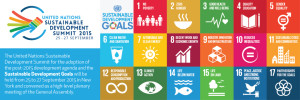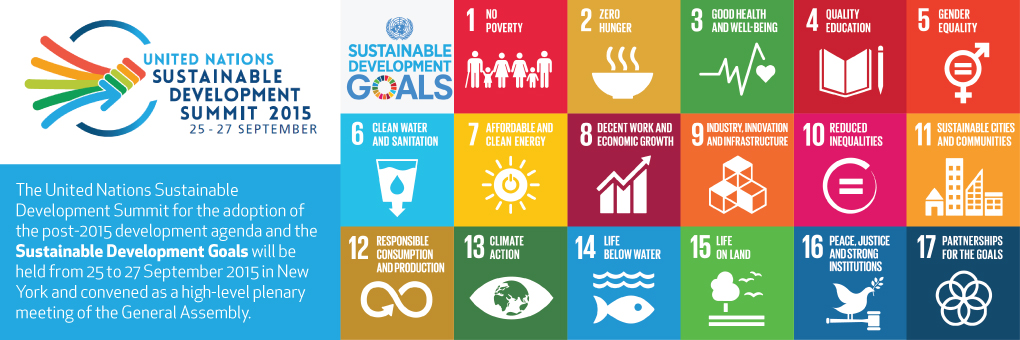 Like many Americans, I have been captivated by Pope Francis and his message of “hope and healing, of peace and justice.” Speaking before Congress, he called on us to remember the Golden Rule: “Do unto others as you would have them do unto you.” (Mt 7:12)
Like many Americans, I have been captivated by Pope Francis and his message of “hope and healing, of peace and justice.” Speaking before Congress, he called on us to remember the Golden Rule: “Do unto others as you would have them do unto you.” (Mt 7:12)
The Pope spoke eloquently about the need to welcome refugees, lift people out of poverty, and address the environmental challenges facing our planet.
Speaking before the 70th Session of the United Nations General Assembly, Pope Francis tied environmental concerns to inequality and the pursuit of power and wealth.
“Economic and social exclusion is a complete denial of human fraternity and a grave offense against human rights and the environment. The poorest are those who suffer most from such offenses,” he said.
The Pope praised the 2030 Agenda for Sustainable Development, which was formally adopted by the United Nations at the Sustainable Development Summit in New York on September 25, 2015. Yet, Pope Francis cautioned members of the United Nations against the impulse to rest on principles without taking action.
The Agenda is lofty in its vision of universal peace, the eradication of poverty, environmental sustainability, and gender equality and empowerment of all women and girls.
This Agenda is a plan of action for people, planet and prosperity. It also seeks to strengthen universal peace in larger freedom. We recognise that eradicating poverty in all its forms and dimensions, including extreme poverty, is the greatest global challenge and an indispensable requirement for sustainable development. All countries and all stakeholders, acting in collaborative partnership, will implement this plan. We are resolved to free the human race from the tyranny of poverty and want and to heal and secure our planet. We are determined to take the bold and transformative steps which are urgently needed to shift the world onto a sustainable and resilient path. As we embark on this collective journey, we pledge that no one will be left behind. The 17 Sustainable Development Goals and 169 targets which we are announcing today demonstrate the scale and ambition of this new universal Agenda. They seek to build on the Millennium Development Goals and complete what these did not achieve. They seek to realize the human rights of all and to achieve gender equality and the empowerment of all women and girls. They are integrated and indivisible and balance the three dimensions of sustainable development: the economic, social and environmental.
The 17 Sustainable Development Goals (SDG’s) with 169 associated targets will come into effect on January 1, 2016, and shape policy decisions for the next 15 years. They seek to end poverty by 2030 and promote shared economic prosperity, social development and environmental protection for all countries. Goal 5 focuses specifically on gender equality and the empowerment of women and girls.
The Pope’s speech echoed many of the same themes, which have a disproportionate impact on women and girls. Human trafficking, sexual exploitation, and slave labor, including prostitution, are rampant in many parts of the world, and are often unwelcome corollaries of mass migration.
Globally, 35% of women have experienced either sexual or physical violence. In some countries, that number increases to 70%. Each year, around 3 million girls and women face the risk of female genital mutilation or cutting. In some countries, as many as 30% of women report that their first sexual experience was coerced or forced.
The problem is exacerbated by the epidemic of mass migration caused by war and violence in Syria, Africa, Central America and other parts of the world.
More than 145,000 Syrian refugee families – one in four of all households – are headed by women. A recent report by UNHCR, the UN Refugee Agency, revealed that most of the women are struggling to survive after the men of the family were killed, captured, or otherwise separated from the family. Women alone face verbal harassment, sexual and gender-based violence simply for the crime of being alone. They live in fear and isolation, concerned about their ability to provide for their children.
The Women’s Refugee Commission reports that adolescent refugee girls, left alone because they have lost their families to conflict, are especially vulnerable to rape and violence. Last year, out of 13,000 unaccompanied minors who arrived as refugees in Italy, 4,000 went missing.
Goal #5 of the SDG’s seeks to address these injustices, seeking to eliminate all forms of violence against women and girls, including trafficking, sexual exploitation, early and forced marriages and female genital mutilation.
These aspirations are nothing new. As early as 1979, the International Convention on the Elimination of All Forms of Discrimination against Women called for equality in political, cultural, economic, social, and family life. 185 countries have ratified the Convention. Yet many of those countries continue to condone cultural practices such as genital mutilation and forced marriages. The United States is among only eight countries of the world that have yet to ratify the treaty, due in large part to political opposition to women’s reproductive freedom.
These facts make the Pope’s cautionary words all the more prescient.
Solemn commitments, however, are not enough, even though they are a necessary step toward solutions….Our world demands of all government leaders a will which is effective, practical and constant, concrete steps and immediate measures for preserving and improving the natural environment and thus putting an end as quickly as possible to the phenomenon of social and economic exclusion…
Adoption of the SDG’s is an inspirational statement by the world’s leaders that it is time to treat the young women and girls of the world as we would like our own daughters to be treated. We call upon our lawmakers to enact and enforce the laws that would put some action behind those promises.
The International Violence Against Women Act (IVAWA) would be a good start. According to Amnesty International:
Violence against women and girls is the definition of a cross-cutting issue that affects women’s abilities to access the full spectrum of their human rights, such as accessing health care, employment, and education.
Violence against women and girls destabilizes countries, impedes economic progress, and prevents women from contributing to their community, and creating better lives for themselves and their families.
Passage of IVAWA would make ending violence against women and girls a top diplomatic, development, and foreign assistance priority. Despite political and cultural barriers that might have to be overcome, the United States would be using its considerable economic and political power in the world to make gender equality more than an empty promise.


